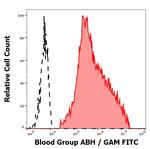Search Thermo Fisher Scientific
Invitrogen
Blood Group ABH Antigen Monoclonal Antibody (HE-10)
FIGURE: 1 / 2
Blood Group ABH Antigen Antibody (MA1-19694) in Flow


Product Details
MA1-19694
Species Reactivity
Host/Isotype
Class
Type
Clone
Immunogen
Conjugate
Form
Concentration
Storage buffer
Contains
Storage conditions
Shipping conditions
RRID
Product Specific Information
This antibody reacts with A and H antigens with chain types 3 and 4 and it does not react with A disaccharide, A trisaccharide, A type 1, A type 2, ALe-b. The antibody HE-10 does not react with normal tissue sections of donors with blood group B and 0 but it reacts specifically with malignant tissue.
Target Information
Blood-group antigens are generally defined as molecules formed by sequential addition of saccharides to the carbohydrate side chains of lipids and proteins detected on erythrocytes and certain epithelial cells. The A, B and H antigens are reported to undergo modulation during malignant cellular transformation. Blood group related antigens represent a group of carbohydrate determinants carried on both glycolipids and glycoproteins. They are usually mucin-type, and are detected on erythrocytes, certain epithelial cells, and in secretions of certain individuals. Sixteen genetically and biosynthetically distinct but inter-related specificities belong to this group of antigens, including A, B, H, Lewis A, Lewis B, Lewis X, Lewis Y, and precursor type 1 chain antigens.
For Research Use Only. Not for use in diagnostic procedures. Not for resale without express authorization.
References (0)
Bioinformatics
Protein Aliases: ABH; BG-H; BG-H1

Performance Guarantee
If an Invitrogen™ antibody doesn't perform as described on our website or datasheet,we'll replace the product at no cost to you, or provide you with a credit for a future purchase.*
Learn more
We're here to help
Get expert recommendations for common problems or connect directly with an on staff expert for technical assistance related to applications, equipment and general product use.
Contact tech support
